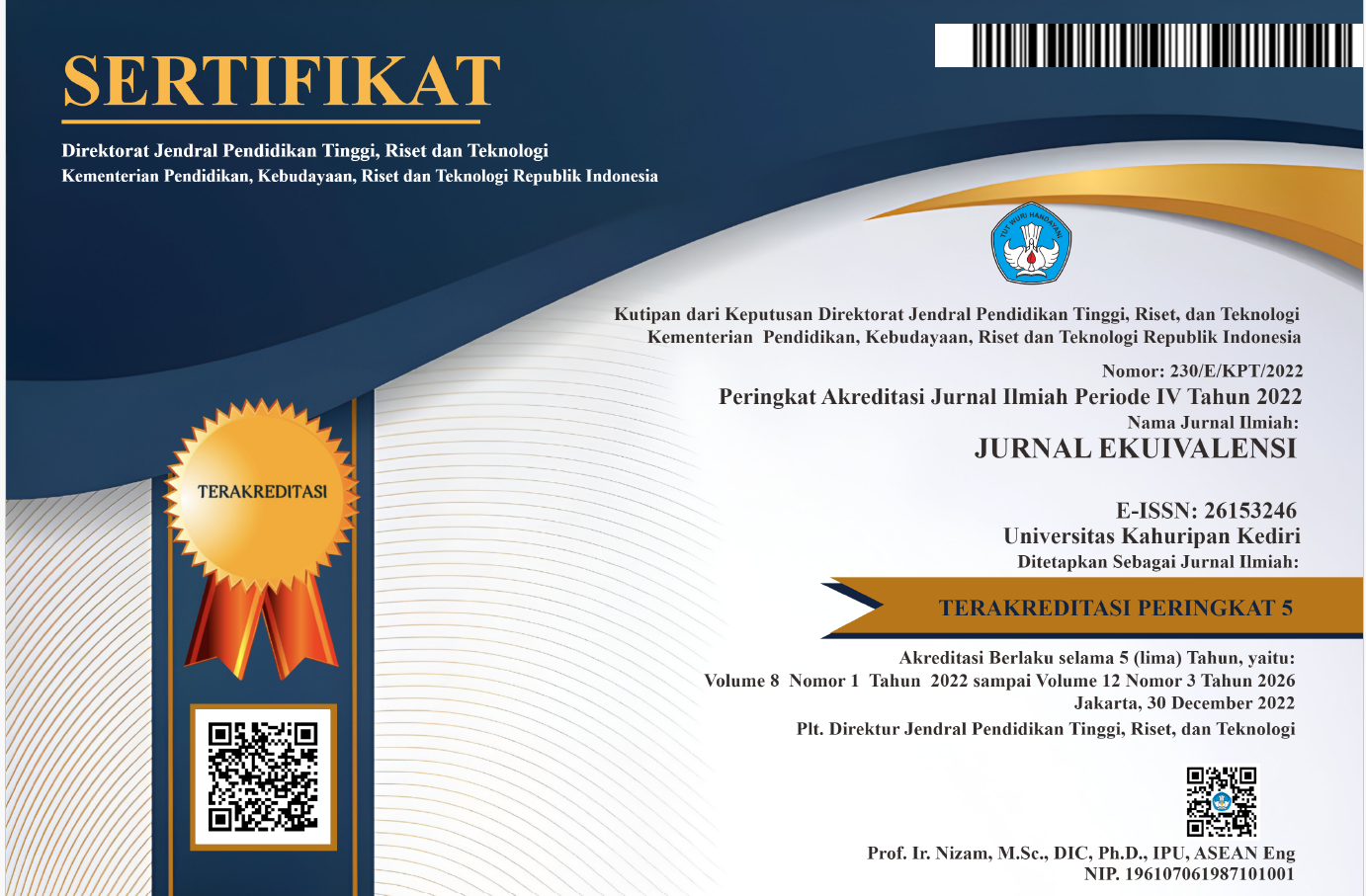Kualitas Auditor sebagai Pemoderasi Hexagon Fraud Theory, Fraudulent Financial Statement & Tax Avoidance
DOI:
https://doi.org/10.51158/g2scqk15Keywords:
Hexagon Fraud Theory, Fraudulent Financial Statement, Tax Avoidance, Fee AuditAbstract
Kajian akuntansi tentang tindakan fraud dalam pelaporan keuangan sejauh ini sebagi-an besar hanya berfokus pada pengujian pengaruh dimensi Hexagon Fraud Theory terhadap Fraudulent Financial Statement, dan belum banyak studi yang menguji peran moderasi kualitas audit eksternal dan mengaitkannya dengan tindakan Tax Avoidance. Berdasarkan data pengamatan 1.083 perusahaan terdaftar di BEI untuk semua sektor industri periode 2021-2022, penelitian ini berhasil membuktikan bahwa kualitas auditor eksternal yang diproksikan dengan fee audit mampu memoderasi em-pat dari enam dimensi Hexagon Fraud Theory terhadap Fraudulent Financial State-ment dan Tax Avoidance, yaitu stimulus, opportunity, rasionalisasi, dan kapabilitas. Manajemen menghindari melakukan kecurangan dan penghindaran pajak karena takut terdeteksi KAP yang berdampak pada opini audit, citra manajemen dan perusahaan dimata pasar. Originalitas penelitian ini terletak pada pengujian moderasi fee audit eksternal dalam pengaruh stimulus, kesempatan, rasionalisasi, kapabilitas, arogansi, dan kolusi terhadap kecurangan laporan keuangan dan penghindaran pajak.
References
ACFE. (2020). Report to the Nations on Occupational Fraud and Abuse: 2020 Global Fraud Study. Association of Certified Fraud Examiners, Inc., 1–88.
Albrecht, C., Holland, D., Malagueño, R., Dolan, S., & Tzafrir, S. (2015). The Role of Power in Financial Statement Fraud Schemes. Journal of Business Ethics, 131(4), 803–813.
Alrashidi, R., Baboukardos, D., & Arun, T. (2021). Audit fees, non-audit fees and access to finance: Evidence from India. Journal of International Accounting, Auditing and Taxation. Elsevier, 43, 100397. https://doi.org/10.1016/j.intaccaudtax.2021.100397
Armadiyanti, P., & Iswati, S. (2019). CORPORATE POLITICAL CONNECTION AND AUDIT QUALITY. Jurnal Akuntansi Dan Keuangan (JAK), 16(2), 122-140s. https://doi.org/10.21002/jaki.2019.07
Astuti, & Aryani. (2016). Tren Penghindaran Pajak Perusahaan Manufaktur di Indonesia yang Terdaftar di Bursa Efek Indonesia tahun 2001-2014. Jurnal Akuntansi, 20(3), 375–388.
Aviantara, R. (2021). The Association Between Fraud Hexagon and Government’s Fraudulent Financial Report. Asia Pacific Fraud Journal, 6(1D), 26–42. https://doi.org/10.21532/apfjournal.v6i1.192
Chen, E., & Gavious, I. (2016). Unrealized earnings, dividends and reporting aggressiveness: An examination of firms’ behavior in the era of fair value accounting. Z, 56(1), 217–250. https://doi.org/10.1111/acfi.12187
Christian, N. (2022). Efek Mediasi Kesulitan Keuangan dalam Mendeteksi Corporate Fraud di Indonesia. Jurnal Kajian Akuntansi, 6(1), 44. https://doi.org/10.33603/jka.v6i1.5576
Cressey, D. R. (1953). Other people’s money: A study in the social psychology of embezzlement. The American Journal of Sociology.
Davis-nozemack, R. B. K. (2016). Tax Avoidance as a Sustainability Problem. Journal of Business Ethics, April. https://doi.org/10.1007/s10551-016-3162-2
Desai, M. A., & Dharmapala, D. (2006). Corporate Tax Avoidance and High-Powered Incentives. Journal of Financial Economics, 79(1), 12–26.
Ding, Z. (2019). Other Comprehensive Income, Auditor Practice Experience and Audit Pricing. American Journal of Industrial and Business Management, 09(01), 233–252. https://doi.org/10.4236/ajibm.2019.91015
Dyreng, S. D., Hanlon, M., Maydew, E. L., & Thornock, J. R. (2017). Changes in corporate effective tax rates over the past 25 years. Journal of Financial Economics, 124(3), 441–463. https://doi.org/10.1016/j.jfineco.2017.04.001
GarcÃa-Meca, E., López-Iturriaga, F. J., & Santana-MartÃn, D. J. (2022). Board gender diversity and dividend payout: The critical mass and the family ties effect. International Review of Financial Analysis, 79. https://doi.org/10.1016/j.irfa.2021.101973
Handoko, B. L. (2021). Fraud Hexagon dalam Mendeteksi Financial Statement Fraud Perusahaan Perbankan di Indonesia. Jurnal Kajian Akuntansi, 5(2), 176. https://doi.org/10.33603/jka.v5i2.5101
Karampinis, N. I., & Hevas, D. L. (2013). Effects of IFRS Adoption on Tax-induced Incentives for Financial Earnings Management : Evidence from Greece ☆. International Journal of Accounting, 48(2), 218–247. https://doi.org/10.1016/j.intacc.2013.04.003
Kim, C., & Zhang, L. (2016). Corporate Political Connections and Tax Aggressiveness. Contemporary Accounting Research, 33(1), 78–114.
Komang, N., & Purnaningsih, C. (2022). Fraudulent Financial Reporting Analysis on Non-Financial Companies Listed on IDX in Hexagon Fraud Perspective. Budapest International Research and Critics Institute-Journal (BIRCI-Journal), 5(2), 11331–11343.
Kusuma, M. (2021a). Measurement of Return on Asset (ROA) based on Comprehensive Income and its Ability to Predict Investment Returns: an Empirical Evidence on Go Public Companies in Indonesia before and during the Covid-19 Pandemic. Ekuilibrium : Jurnal Ilmiah Bidang Ilmu Ekonomi, 16(1), 94. https://doi.org/10.24269/ekuilibrium.v16i1.3238
Kusuma, M. (2021b). Modification of Profitability Measures with Comprehensive Income and Reclassification of Other Comprehensive Income as A Mediation of Effects Asset Utilization on Firm Value. Jurnal Keuangan Dan Perbankan, 25(4), 855–879. https://doi.org/10.26905/jkdp.v25i4.6132
Kusuma, M. (2023). Can the Reclassification of Others Comprehensive Income Narrow Opportunities for Creative Accounting: Earnings Management and Income Smoothing? Jurnal Akuntansi Dan Keuangan, 25(1).
Kusuma, M. (2020). Penghasilan komprehensif lain dan prediksi arus kas masa depan : Bukti dari Indonesia. Seminar Nasional SENIMA Ke 5 Universitas Negeri Surabaya, Senima 5, 815–832. http://bit.ly/ProsidingSenima5
Kusuma, M., Assih, P., & Zuhroh, D. (2021). Pengukuran Kinerja Keuangan : Return on Equity ( ROE ) Dengan Atribusi Ekuitas. Jurnal Ilmiah Manajemen Dan Bisnis, 22(2), 223–244. https://doi.org/10.30596/jimb.v22i2.7935
Kusuma, M., & Athori, A. (2023). Can Income and Equity Attribution Minimize Agency Costs ? ( Effect of Attribution Policy on Earnings Management and Firm Value ). Proceeding Medan International Conference Economics and Business (MICEB), 1(January), 1950–1962. https://proceeding.umsu.ac.id/index.php/Miceb/index
Kusuma, M., Chandrarin, G., Cahyaningsih, D. S., & Lisetyati, E. (2022). Reclassification of Others Comprehensive Income, Earnings Management, and Earnings Quality : Evidence From Indonesia. Asia-Pacific Management Accounting Journal, 17(3), 205–237. https://apmaj.uitm.edu.my/index.php/current/20-cv17n3/165-av17n3-8
Kusuma, M., & Rahayu, P. (2022). Can Others Comprehensive Income Be Used For Tax Avoidance? Jurnal Akuntansi Dan Keuangan (JAK), 24(2), 68–79. https://jurnalakuntansi.petra.ac.id/
Kusuma, M., & Saputra, B. M. (2022). Pengaruh Fundamental Makro Ekonomi Terhadap Penghasilan Komprehensif Lain dan Persistensi Laba Komprehensif. Jurnal Kajian Akuntansi, 6(1), 145–176.
Kusuma, M., Zuhroh, D., Assih, P., & Chandrarin, G. (2021). The Effect of Net Income and Other Comprehensive Income on Future’s Comprehensive Income With Attribution of Comprehensive Income as Moderating Variable. International Journal of Financial Research, 12(3), 205–219.
Larum, K., Zuhroh, D., & Subiyantoro, E. (2021). Fraudlent Financial Reporting: Menguji Potensi Kecurangan Pelaporan Keuangan dengan Menggunakan Teori Fraud Hexagon. AFRE (Accounting and Financial Review), 4(1), 95–106. https://doi.org/10.26905/afr.v4i1.5957
Lastanti, H. S., Murwaningsari, E., Umar, H., & Trisakti, U. (2022). THE EFFECT OF HEXAGON FRAUD ON FRAUD FINANCIAL STATEMENTS WITH GOVERNANCE AND CULTURE AS. Media Riset Akuntansi, Auditing & Informasi, 22(1), 143–156.
Manurung, J. T. P. (2020). Praktik Penghindaran Pajak di Indonesia. Praktik Penghindaran Pajak Di Indonesia. https://pajak.go.id/id/artikel/praktik-penghindaran-pajak-di-indonesia
Mappadang, A. (2021). Corporate Governance and Corporate Tax Avoidance: an Interactive Effects (Evidence from Indonesia Capital Market). Jurnal Keuangan Dan Perbankan, 25(1), 81–92. https://doi.org/10.26905/jkdp.v25i1.5043
Marks, J. (2012). The mind behind the fraudsters crime: Key behavioral and environmental elements. ACFE Global Fraud Conference.
Meidijati, & Amin, M. N. (2022). Detecting Fraudulent Financial Reporting Through Hexagon Fraud Model: Moderating Role of Income Tax Rate. International Journal of Social and Management Studies (IJOSMAS), 3(2), 311–322. http://www.ijosmas.org
Mundiroh, S., & Ningsih, F. E. (2022). Pengaruh Fraud Pentagon Terhadap Tax Avoidance. Jurnal Ilmiah Raflesia Akuntansi, 8(2015), 33–43.
Murdiyanto, E., & Kusuma, M. (2022). Moderasi Leverage dalam Pengaruh Ukuran Bank dan Aset Keuangan Terhadap Kinerja Keuangan Komprehensif BPR Konvensional dan BPR Syariah Se-Kediri Raya. Jurnal Ekonika : Jurnal Ekonomi Universitas Kadiri, 7(2). http://ojs.unik-kediri.ac.id/index.php/ekonika/index
Muslim, A. I., & Setiawan, D. (2020). a Literature Review of Tax Avoidance. Assets: Jurnal Akuntansi Dan Pendidikan, 9(2), 83. https://doi.org/10.25273/jap.v9i2.6112
Narsa, N. P. D. R. H., Afifa, L. M. E., & Wardhaningrum, O. A. (2023). Fraud triangle and earnings management based on the modified M-score: A study on manufacturing company in Indonesia. Heliyon, 9(2), e13649. https://doi.org/10.1016/j.heliyon.2023.e13649
Nasirudin, I. M., & Trisnawati, R. (2023). FAKTOR-FAKTOR YANG MEMPENGARUHI TAX AVOIDANCE PADA PERUSAHAAN PROPERTY DAN REAL ESTATE. Jurnal Akuntansi Dan Keuanganc, 8(01), 54–68.
Nugroho, D., & Diyanty, V. (2022). Hexagon Fraud in Fraudulent Financial Statements: the Moderating Role of Audit Committee. Jurnal Akuntansi Dan Keuangan Indonesia, 19(1), 46–67. https://doi.org/10.21002/jaki.2022.03
Oktaviani, H. N. (2020). Deteksi Indikasi Penghindaran Pajak Menggunakan Fraud Diamond Theory. Jurnal Ilmiah Mahasiswa FEB, 8(2S).
Oktaviany, F., & Reskino. (2023). Financial Statement Fraud: Pengujian Fraud Hexagon Dengan Moderasi Audit Committee. Jurnal Bisnis Dan Akuntansi, 25(1), 91–118. https://doi.org/10.34208/jba.v25i1.1799
Putra, Z. K. P., & Suhardianto, N. (2020). The Influence of Political Connection on Tax Avoidance. Jurnal Akuntansi Dan Keuangan, 22(2), 82–90. https://doi.org/10.9744/jak.22.2.82-90
Sagala, S. G., & Siagian, V. (2021). Pengaruh Fraud Hexagon Model Terhadap Fraudulent Laporan Keuangan pada Perusahaan Sub Sektor Makanan dan Minuman yang Terdaftar di BEI Tahun 2016-2019. Jurnal Akuntansi, 13(2), 245–259. https://doi.org/10.28932/jam.v13i2.3956
Saifudin, S., & Januarti, I. (2023). Semiotics of audit quality : a meta-analysis perspective. Journal of Accounting and Investment, 24(3), 861–876. https://doi.org/10.18196/jai.v24i3.19390
Salehi, M., Ali Mirzaee, M., & Yazdani, M. (2017). Spiritual and emotional intelligences, financial performance, tax avoidance and corporate disclosure quality in Iran. International Journal of Law and Management, 59(2), 237–256. https://doi.org/10.1108/IJLMA-11-2015-0059
Sari, S. P., & Khoiriah, N. (2021). Hexagon Fraud Detection of Regional Government Financial Statement as A Fraud Prevention on The Pandemic Crisis Era. Jurnal Wacana, 24(2), 90–96. https://wacana.ub.ac.id/index.php/wacana/article/view/897
Shin, H. J., & Woo, Y. S. (2018). The effect of tax avoidance on cost of debt capital: Evidence from Korea. South African Journal of Business Management, 48(4), 83–89. https://doi.org/10.4102/sajbm.v48i4.45
Suharsana, Y., & Prisiena, C. (2019). FAKTOR YANG MEMPENGARUHI KECURANGAN LAPORAN KEUANGAN DENGAN PERSPEKTIF FRAUD TRIANGLE (Studi Empiris pada Perusahaan Property, Real Estate dan Building Construction). GEMA : Jurnal Gentiaras Manajemen Dan Akuntansi, 11(2), 137–147. https://doi.org/10.47768/gema.v11i2.165
Sukmadilaga, C., Winarningsih, S., Handayani, T., Herianti, E., & Ghani, E. K. (2022). Fraudulent Financial Reporting in Ministerial and Governmental Institutions in Indonesia: An Analysis Using Hexagon Theory. Economies, 10(4). https://doi.org/10.3390/economies10040086
Vousinas, G. L. (2019). Advancing theory of fraud: The S.C.O.R.E. Model. Journal of Financial Crime, 26(1), 372–381.
Widyastuti, R. A. Y. (2021). 2020, Penerimaan Pajak Capai Rp 1.069,98 Triliun atau 89,25 Persen dari Target. Bisnis Tempo. https://bisnis.tempo.co/read/1440165/2020-penerimaan-pajak-capai-rp-1-06998-triliun-atau-8925-persen-dari-target?page_num=2
Wolfe, D. T., & Hermanson, D. R. (2004). The fraud diamond: Considering the four elements of fraud. CPA Journal, 38–42. http://biblioteca.usac.edu.gt/tesis/08/08_2469_C.pdf
Yefni, & Sari, P. (2021). Akankah Fee Audit dan Karakteristik Auditor Menentukan Kualitas Audit? Jurnal Akuntansi Multiparadigma, 12(1), 173–185.
Yuanita, D. W., Dewi, C. N., Susilo, A. Z., & Kusharyanti, K. (2020). Foreign investor’s interest and tax avoidance: contingency perspectives depending on coun-try’s protection level and law systems. Gadjah Mada International Journal of Business, 22(1), 74–98. https://doi.org/10.22146/gamaijb.43521
Zeng, T. (2019). Relationship Between Corporate Social Responsibility And Tax Avoidance International Evidence. Social Responsibility Journal, 15(2), 244–257.












